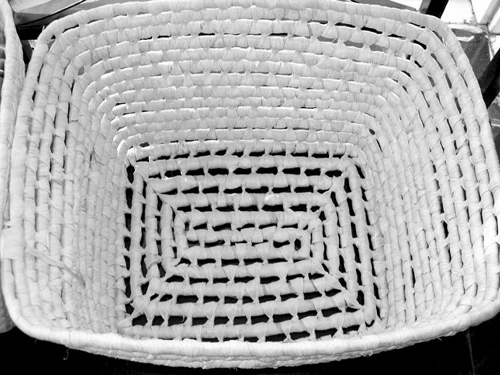 In the countryside, weeds such as weeds and bamboo shells and corn bran are waste that no one wants. It has long been neglected. However, in recent years, with the development of the production of handicrafts and the expansion of the market, these inconspicuous things have been processed into treasure, and exported to all countries in the world, bringing with them.
In the countryside, weeds such as weeds and bamboo shells and corn bran are waste that no one wants. It has long been neglected. However, in recent years, with the development of the production of handicrafts and the expansion of the market, these inconspicuous things have been processed into treasure, and exported to all countries in the world, bringing with them. Counting money inside the weeds, Wang Yan, a farmer from Tianjiao Village, Shangji Town, Suilen County, Heilongjiang Province heard that Chinese straw is very popular in South Korea and Japan. He went to the nearby river to cut wild grass and wicker, and tried to compose straw ornaments. At the same time, she also went to the foreign trade department to consult. Wang Yan also made a large number of advertisements to buy weeds. When we heard that weeds made money, the villagers also learned to compile straw ornaments with Wang Yan. In the winter of that year, Wang Yan organized the folks to compose straw ornaments and taught them weaving techniques. They quickly developed the team to more than 620 people. Everyone could make money on the gimmicks. Wang Yan saw good business and made profits every year. She also registered trademarks for straw ornaments in the village. Their straw accessories were also increased from five varieties to hundreds, and they were exported to South Korea, Japan, and Singapore.
Before the export of bamboo husks from Xinlai County, the forest farmer Xu Qiwei of Anfeng Village, Zhushan Town, Liangping County, Chongqing Municipality sold 15 kilograms of bamboo husks from the bamboo forest to the purchaser for more than 20 yuan. He said happily: “This year, he spent 25 days on bamboo husks and sold more than 400 yuan.†It is understood that Liang Ping bamboo husks were exported to Japan, South Korea and other Southeast Asian countries. Previously worthless bamboo husks became Liang Ping. Farmer's rich baby.
In recent years, Japan, South Korea and other Southeast Asian countries have popularized the use of environmentally friendly and ecological bamboo shells for food packaging and cutlery processing, and the demand is large. Liangping Zhushan, Seven Stars and other township farmers went to work in coastal areas such as Fujian and Zhejiang. Local smart businessmen captured Liang Ping’s information about a large number of bamboo husks “long in the mountains were not known.†Then they came to Liang Ping to purchase the “babyâ€. And soon became popular in the market. Huang Yunyong, mayor of Zhushan Town, Liangping County, disclosed that the town has an annual output of more than 130 tons of bamboo husks and achieved sales revenue of about 1.5 million yuan.
Millions of corn husks were produced in the straw pavilion of Guo Wentong, a grass-laying household in Gaotou Township, Gaoqing County, Shandong Province, and were filled with hundreds of straw hulls such as corn fur package, futons, handbags and straw baskets. Guo Wentong pointed to a very fashionable straw handbag and said: "Such a straw bag will sell for more than 30 US dollars in the international market!" Every fall, every household buys straw, corn husks, and other crop stalks from the field, after strict screening. After weaving, a family woman makes up for 6 months and at least has to earn more than 5,000 yuan. At present, there are 16,000 people in the county engaged in typha and corn husk weaving. The products are exported to Japan, South Korea, the European Union and other international markets with an annual output value of more than 18 million yuan.
Sunglasses, Glasses, Metal Frame Sunglasses
Women Sunglasses,Men Sunglasses Co., Ltd. , http://www.chsunglasses.com